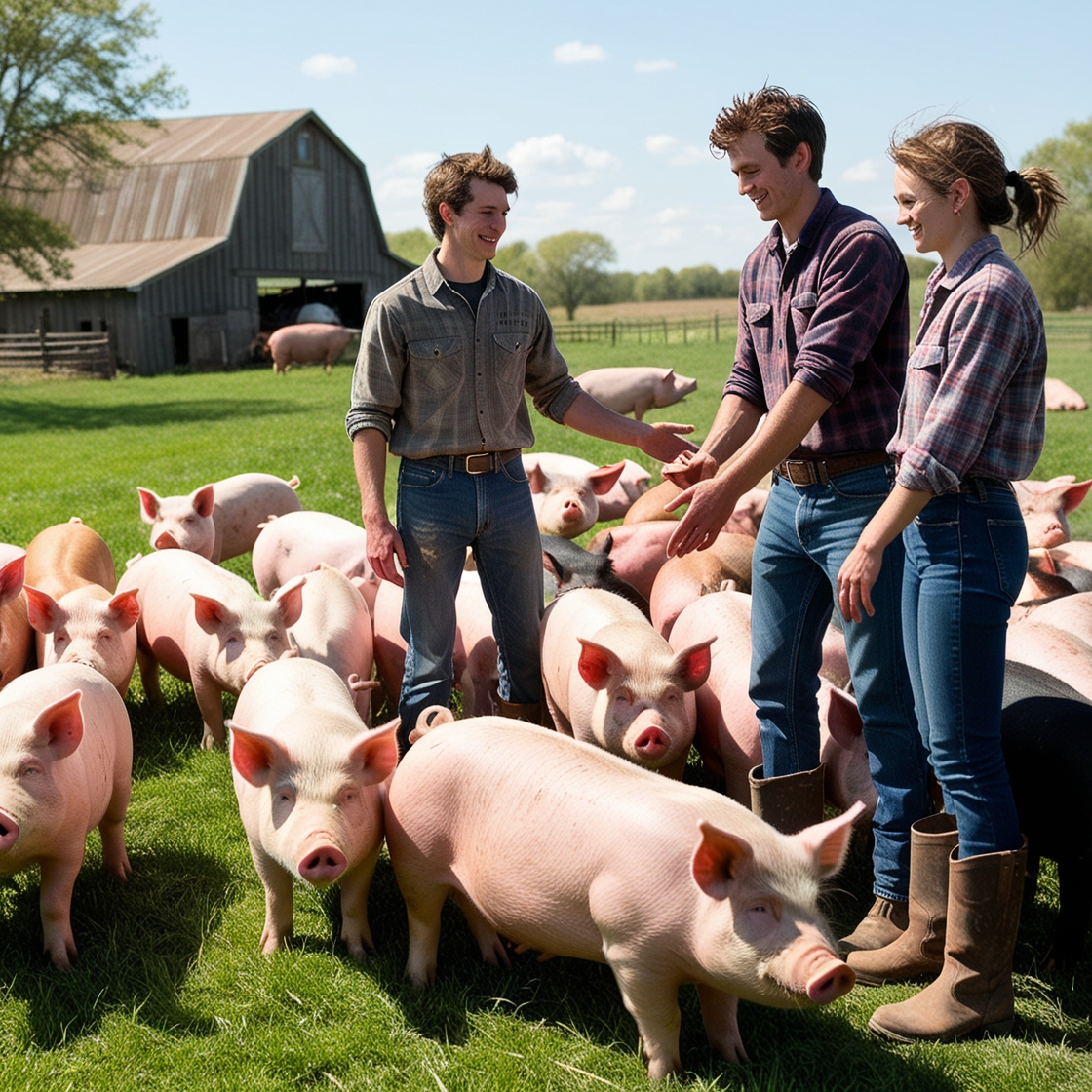Introduction: The Revival of a Lost Tradition
In the heart of the American Midwest, a new generation of farmers is reviving an old way of life. Small-scale, humane hog farming is making a comeback in Iowa, once known as the hog farming capital of the United States. These young farmers are challenging industrial farming practices by embracing sustainability, animal welfare, and community-driven agriculture. This movement signals a shift back to traditional farming values, enhanced with modern innovations to meet today’s challenges.
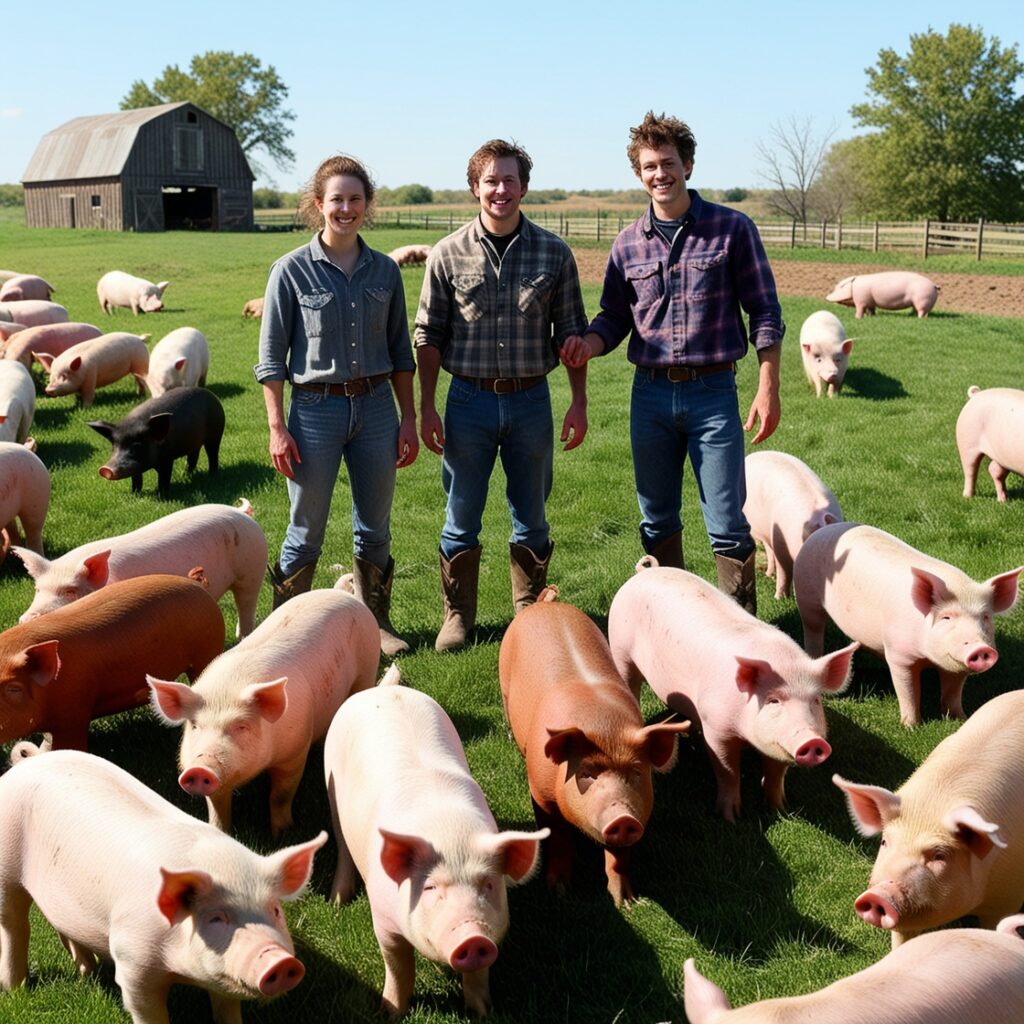
The Historical Significance of Hog Farming in Iowa
Early Roots of Iowa’s Hog Industry
Iowa’s fertile soil and temperate climate have made it an ideal location for hog farming for over a century. By the mid-20th century, the state became synonymous with pork production. Family farms thrived, and communities were built around this vital industry.
The Rise of Industrial Farming
The 1970s and 1980s saw a shift toward industrial-scale hog farming. While this increased production efficiency, it also introduced significant environmental and ethical concerns. Family farms struggled to compete, and many were forced out of business, leaving Iowa’s farming landscape dominated by corporate operations.
The New Wave of Small-scale Hog Farmers
Who Are the Young Farmers?
These new farmers come from diverse backgrounds—some are returning to their family roots, while others are first-generation farmers drawn by a passion for sustainable agriculture. Equipped with knowledge and tools, they are transforming the hog farming industry.
What Motivates Them?
- Environmental Sustainability: Reducing the carbon footprint and promoting soil health.
- Animal Welfare: Providing pigs with spacious, stress-free environments.
- Community Impact: Strengthening local economies and fostering connections.
Practices That Define Humane Hog Farming
Pasture-raised and Free-range Systems
Young farmers are prioritizing systems where hogs roam freely. These practices align with humane treatment and allow pigs to exhibit natural behaviors.
Nutritional and Ethical Feeding
Hogs are fed organic or non-GMO grains, often sourced locally. This approach ensures higher-quality pork and supports the local economy.
Elimination of Antibiotics and Hormones
These farmers avoid routine antibiotics and hormones, reducing risks to public health and promoting ethical farming.
Challenges Facing Small-scale Hog Farmers
Competition with Industrial Giants
Competing with large-scale producers in terms of pricing and market access remains a significant hurdle.
High Initial Investment Costs
Starting a humane hog farm requires substantial investment in land, infrastructure, and equipment.
Navigating Regulations
Strict agricultural and environmental regulations can pose additional challenges, especially for new farmers.
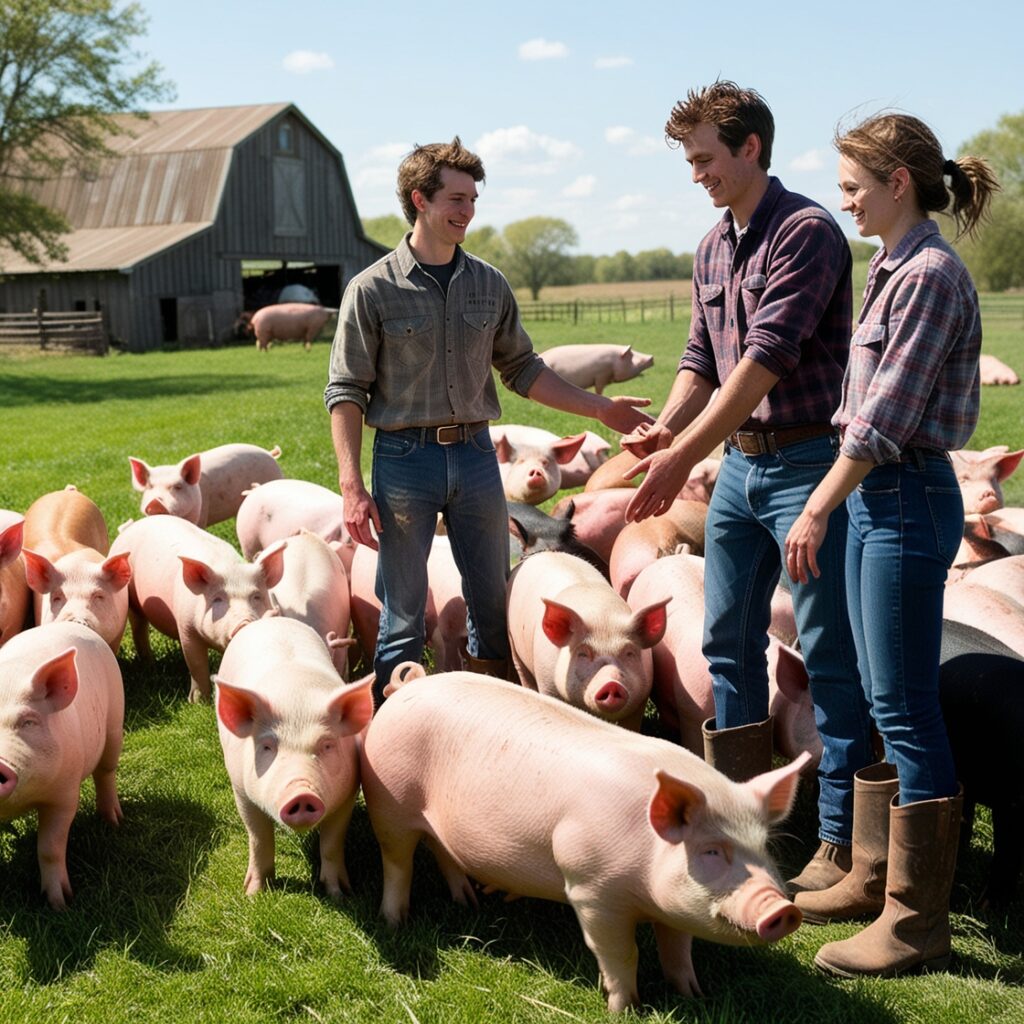
Innovations and Strategies for Success
Embracing Technology
From farm management software to innovative feeding systems, technology is playing a vital role in making small-scale farming more efficient.
Direct-to-consumer Models
Farmers are leveraging farmers’ markets, CSA (Community Supported Agriculture) programs, and e-commerce platforms to sell their products directly to consumers.
Building Cooperative Networks
Collaborative efforts among small-scale farmers, such as shared resources and marketing initiatives, are fostering growth and resilience.
Environmental and Economic Benefits
Reducing Environmental Impact
- Improved Soil Health: Using rotational grazing and composting methods.
- Lower Emissions: Cutting down on greenhouse gases compared to industrial farms.
Boosting Local Economies
Small-scale hog farming creates jobs, supports local businesses, and keeps money within the community.
The Role of Consumers in Supporting Humane Farming
Shifting Consumer Preferences
Today’s consumers are more informed and demand ethically produced food. This change is driving demand for humane pork.
Educating the Public
Farmers are engaging with consumers through farm tours, educational workshops, and social media to highlight the benefits of their practices.
Case Studies: Success Stories in Iowa
Farmer A: Revitalizing a Family Farm
This farmer transitioned their multi-generational farm into a small-scale, humane operation, doubling profitability within five years.
Farmer B: First-generation Success
Starting with minimal resources, this farmer has become a leading voice in the humane hog farming movement, leveraging crowdfunding and grants.
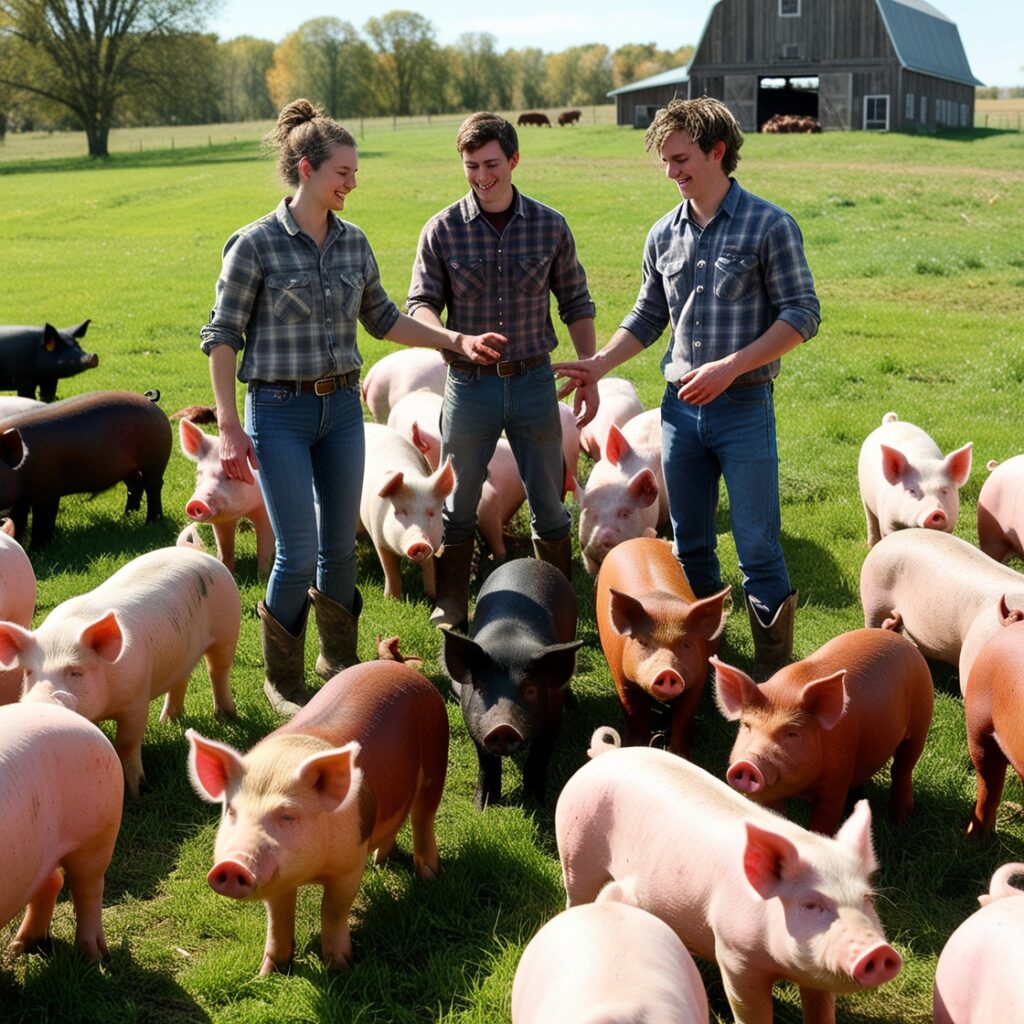
Challenges on the Horizon
Climate Change
Rising temperatures and unpredictable weather patterns threaten farming practices.
Market Access
While consumer demand for humane pork is growing, accessing larger markets remains a challenge.
The Future of Humane Hog Farming in Iowa
Expanding Networks and Collaborations
Building stronger coalitions among farmers, consumers, and policymakers will be essential for long-term success.
Policy Advocacy
Lobbying for fairer agricultural policies can help level the playing field for small-scale farmers.
Continued Innovation
Research and development in sustainable practices will ensure the movement’s resilience.
The New Wave of Hog Farming in Iowa
Small-scale hog farming is making a comeback in Iowa, driven by young farmers committed to sustainable and humane practices. These farmers are reviving old traditions by focusing on free-range systems, natural feed, and ethical treatment of animals. Their efforts contrast with industrial hog farming, emphasizing care and quality over mass production.
Why Small-scale Farming Matters for Iowa’s Economy
Small-scale farming not only benefits the environment but also revitalizes rural economies. By sourcing locally and keeping operations family-run, these farms generate local jobs, support small businesses, and create opportunities for younger generations to stay in agriculture.
Innovative Practices for Ethical Hog Farming
Young farmers are introducing innovative practices, such as rotational grazing and regenerative farming techniques. These methods prioritize soil health, reduce pollution, and ensure the pigs grow in stress-free environments. The result is healthier animals and higher-quality meat.
The Challenges Facing Small-scale Hog Farmers
While this movement is inspiring, young farmers face challenges like high land costs, competition from large-scale producers, and navigating state regulations. However, community support and partnerships with local markets have helped them overcome these hurdles.
Meet the Farmers: Stories from the Heartland
Several inspiring stories highlight these farmers’ dedication. Take Emma and Jake, who returned to their family farm after college to raise pasture-raised hogs. Their approach combines tradition with modern techniques, proving that humane farming can be profitable and sustainable.
The Role of Technology in Modern Hog Farming
Technology is helping small-scale farmers thrive. From drone monitoring of pastures to apps that track animal health, young farmers are leveraging tech to optimize efficiency while maintaining their commitment to humane practices.
Building Consumer Awareness About Ethical Pork
Educating consumers about humane hog farming is key. Farmers are connecting directly with customers at farmers’ markets and through online platforms, sharing their journey and emphasizing why buying ethical, local meat matters.
Environmental Benefits of Humane Hog Farming
Small-scale farms contribute to environmental health by reducing the carbon footprint of meat production. Practices like composting waste and minimizing antibiotic use protect waterways and promote biodiversity.
How Communities Are Supporting Local Hog Farmers
Community-supported agriculture (CSA) programs and local food co-ops play a significant role in helping these farms succeed. By fostering a local food movement, communities are ensuring the long-term viability of humane farming.
The Future of Small-scale Hog Farming in Iowa
As more consumers prioritize sustainability, the future looks bright for humane hog farming. With increasing demand for ethically raised pork, these farms are poised to reshape Iowa’s agricultural landscape.
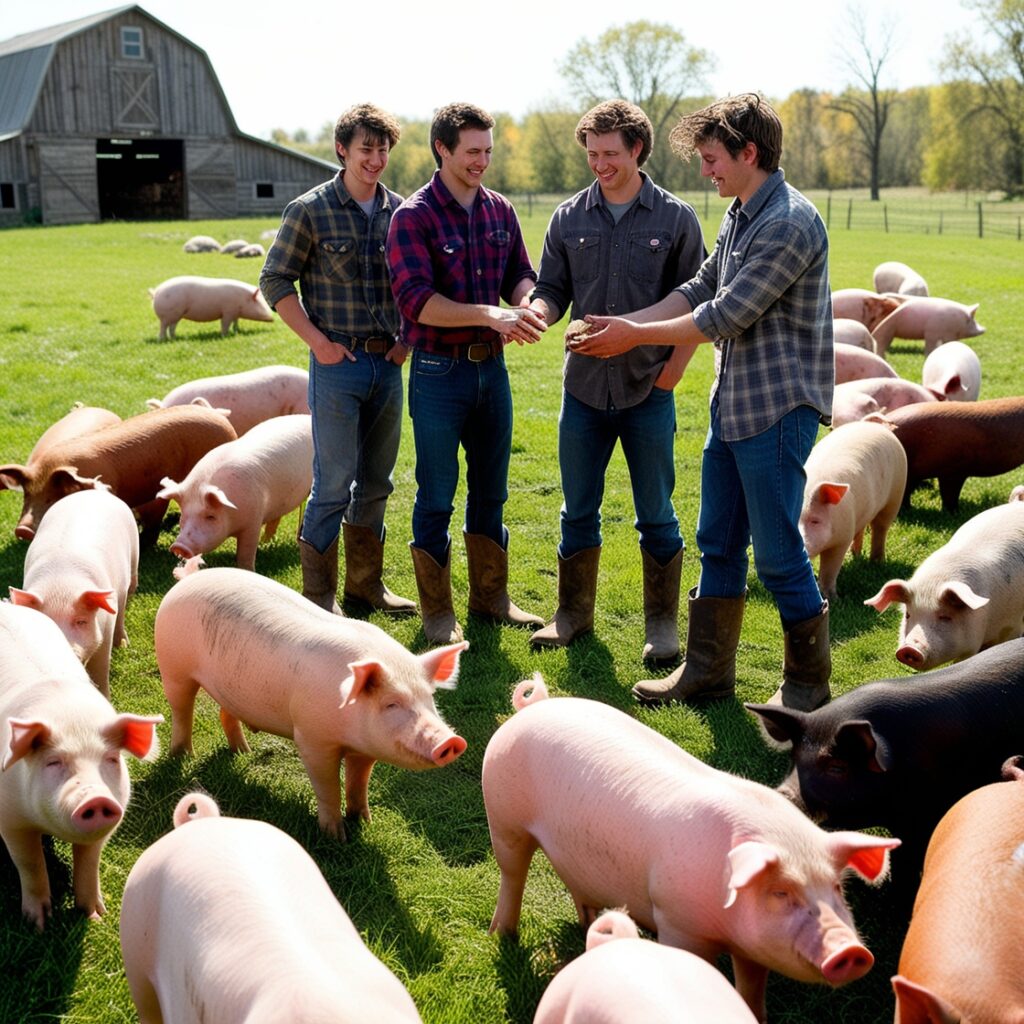
FAQs About Small-scale, Humane Hog Farming in Iowa
- What makes humane hog farming different?
Humane hog farming prioritizes the animals’ well-being, including free-range living conditions, natural diets, and reduced stress environments. - Why is small-scale farming gaining popularity?
Consumers are increasingly interested in sustainably produced and ethically sourced food, creating a demand for small-scale farming. - Are there environmental benefits to small-scale farming?
Yes, it helps reduce pollution, improves soil health, and minimizes the environmental impact compared to industrial farming. - How can I support local hog farmers in Iowa?
You can buy directly from local farms, join CSAs, or choose products labeled as pasture-raised or ethically sourced. - What challenges do small-scale hog farmers face?
High costs, market competition, and regulatory hurdles are some of the significant challenges they encounter. - Is pork from small-scale farms more expensive?
It can be slightly pricier due to the higher cost of humane practices, but many consumers find the quality worth it. - Do small-scale farms use antibiotics?
Most avoid routine antibiotics, focusing on preventive care and healthy living conditions for their animals. - Can humane farming feed a growing population?
While it may not fully replace industrial farming, it offers a sustainable alternative for quality meat production. - What breeds are raised on these farms?
Farmers often choose heritage breeds, which thrive in outdoor environments and produce flavorful meat. - How does humane farming impact rural communities?
It boosts local economies, preserves family farming traditions, and encourages sustainable land use.
Conclusion: A Hopeful Return to Iowa’s Roots
Young farmers in Iowa are proving that small-scale, humane hog farming is not only viable but essential for a sustainable and ethical future. By blending traditional values with modern practices, they are breathing new life into an industry once dominated by industrial farming. As consumers and communities rally behind these efforts, Iowa stands as a beacon of hope for humane agriculture across the nation.







